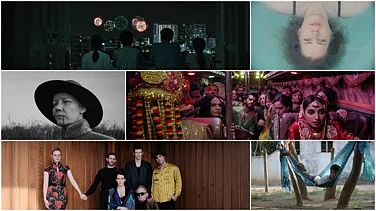In what's probably a first in Indian cinema, hockey legend Dhyan Chand gets a song. Or at least a refrain, as in "Dhyan kitthe, Dhyan Chand?" That chorus is among the raucous assembly of songs that define director Anurag Kashyap's latest feature, Manmarziyaan, or as it is curiously titled in English, Husband Material. As it premiered at the Toronto International Film Festival or TIFF, it became obvious that composer Amit Trivedi (Queen) certainly earned his fee. Because the music verges on overkill, and not in a good way as with Kashyap's classic Gangs of Wasseypur films, but as in exploding out seemingly every alternate minute. The music is actually catchy, but after the first dozen tracks, gets somewhat numbing.

This appears to be Kashyap's version of a mainstream Bollywood masala production, but given his style, more like Kuch Kuch Hota Hai set in a Tier II town, amidst grit and grime, in a middle-class milieu, and far more adventurous than such sanitised romances. The film revolves around Rumi, a young girl in Amritsar, her roaring affair with Vicky (Vicky Kaushal), and the entrance of Bonnie, a banker from London (Abhishek Bachchan). An arranged marriage takes place between Rumi and Bonnie, though not without multiple complications, like her eloping briefly with Vicky, before discovering he has all the maturity contained in a Donald Trump tweet. The triangle though, persists, and the film is about choices: Bonnie's solidity versus Vicky's anima attraction.
Taapsee Pannu as Rumi is feisty and fiery, like what you've seen in the past in roles played by Preity Zinta, though on steroids. With her angst and anger management issues, Rumi is probably among the most atypical heroines to appear in a Hindi movie. Pannu gets into the skin of the character with plenty of fire and flair. Kaushal's Vicky is the warm body without too much intelligence or initiative. Bachchan's Bonnie is vanilla, and in a role reversal, is that caring, understanding, suffering, patient lover that we tend to associate with characters of the other gender.

All of that would have made for nice entertainment, if again each of those traits didn't become so cloyingly repetitive in this overly long movie. Not that it doesn't have its great moments, like the final scene, a touching and imaginative climax. Critics, like this one, will argue that such emotive punch was far too scarce in the two-and-half-hours.


























